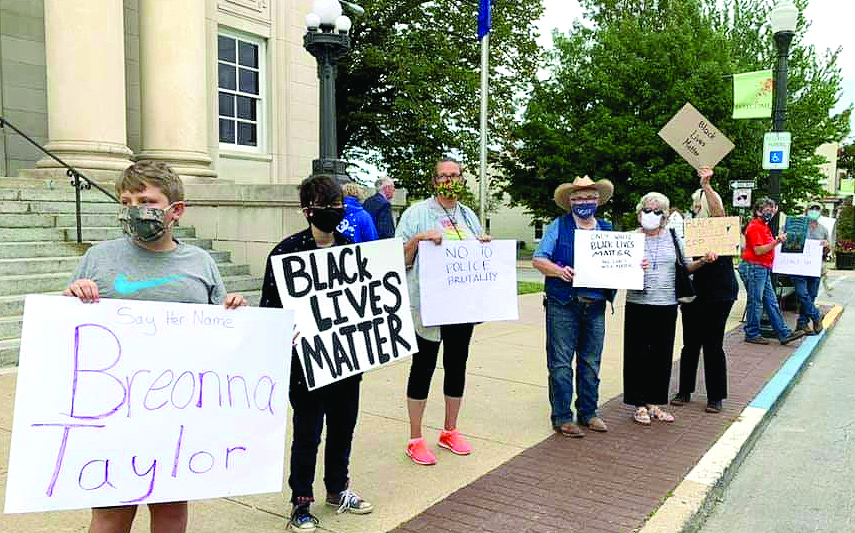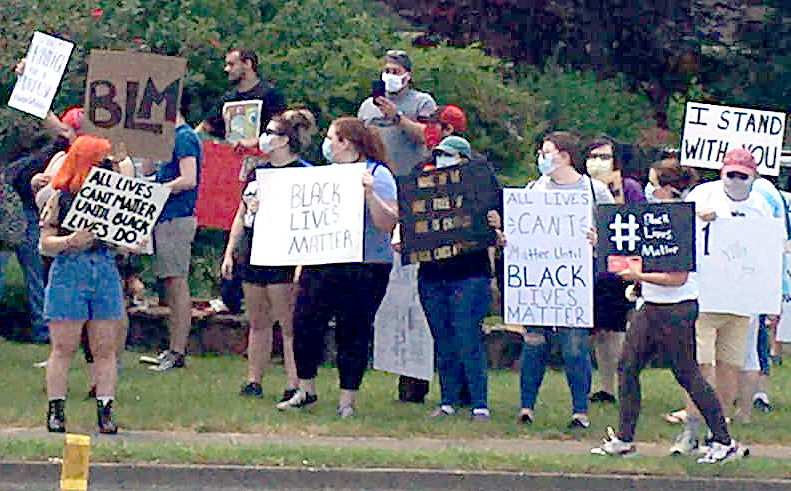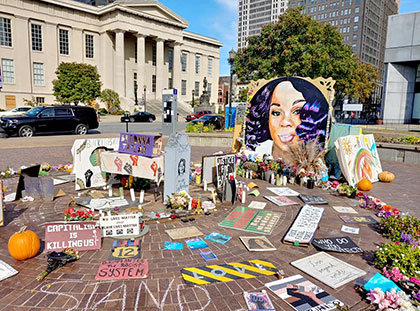Amplifying and learning from the Louisville uprising
On March 13, Louisville Metro Police Department (LMPD) murdered Breonna Taylor – a 26-year-old Black woman, award-winning EMT and beloved community member – while she was resting in her own home.
Coinciding with a nationwide uprising for racial justice and Black liberation, Breonna Taylor’s death has sparked a months-long resistance movement in Louisville and across Kentucky.
For months, organizers committed to protecting racial justice in Louisville have demanded accountability for the police officers who murdered Taylor, divesting from the Louisville Metro Police Department’s $190 million annual budget and reinvesting in community resources.
These demands have been amplified and repeated throughout the country and Kentucky – from Lexington’s movement for police accountability
(lpdaccountability.com) to countless solidarity actions in rural and small towns.
 It’s also true that the Louisville uprising has come with incredible loss and hardship. These include the murder of David “YaYa” McAtee, a Black man killed by National Guard and Louisville police outside the barbecue restaurant he owned; the murder of Tyler Gerth, a white photographer and activist shot in Injustice Square Park, where protesters have taken up space and erected a memorial for Breonna Taylor; and the LMPD arrest of hundreds of protesters speaking out against white supremacy.
It’s also true that the Louisville uprising has come with incredible loss and hardship. These include the murder of David “YaYa” McAtee, a Black man killed by National Guard and Louisville police outside the barbecue restaurant he owned; the murder of Tyler Gerth, a white photographer and activist shot in Injustice Square Park, where protesters have taken up space and erected a memorial for Breonna Taylor; and the LMPD arrest of hundreds of protesters speaking out against white supremacy.
Attorney General Cameron’s failure to deliver justice for Taylor through the grand jury proceedings also contributed to the movement’s hardship.
Despite these challenges, Louisville organizers have shaped one of the most long-standing and resilient movements in the country. Thanks to the leadership of Black, Indigenous and People of Color organizers, the uprising continues.
Breonna’s Law – a win for Louisville, and hopefully for Kentucky
Due to this leadership, particularly the leadership of Black women, the city of Louisville has already seen some remarkable wins in this uprising.
One of the most notable wins was when Louisville’s Metro Council listened to public pressure, led by ACLU strategist Keturah Herron and others, to unanimously pass “Breonna’s Law” – which banned the use of “no-knock” warrants (the type of warrant used by LMPD the night Breonna died).
Attica Scott, a long-time KFTC ally who serves as the only Black woman in the state legislature, is leading the movement to ban no-knock warrants beyond Louisville. In August, she pre-filed legislation for a statewide Breonna’s Law, to be considered by the 2021 General Assembly (learn more and become a “community cosponsor” of the legislation at atticascott4ky.com/breonnas-law).
Looking Forward
The uprisings for racial justice, combined with a pandemic and an election season like no other, have offered important lessons. The work for KFTC members, and all Kentuckians, in 2021 is to learn from events of this year to achieve the anti-racist Kentucky.
 “We have learned the importance of abolitionist frameworks in our organizing – and that to invest in community, we need to divest from the systems that don’t serve us,” pointed out Aja Holston-Barber, who consults with KFTC on equity issues.
“We have learned the importance of abolitionist frameworks in our organizing – and that to invest in community, we need to divest from the systems that don’t serve us,” pointed out Aja Holston-Barber, who consults with KFTC on equity issues.
“We have learned that we need to show up for each other, and to create spaces and ecosystems for people to show up for each other.”
All Kentuckians have a role in this work, KFTC members are learning. There is a role for white people doing self-work and working with other white people to move toward an anti-racist vision.
There is a role for rural-urban solidarity in the face of white supremacy and scarcity.
There is a place and a need for the progressive movement in Kentucky to keep leaning into a deeper commitment to anti-racist organizing that brings about our collective liberation.
And, perhaps most important, this uprising demonstrates that Black, Indigenous and people of color people are showing up, are leading and are ready to be supported. It’s up to the rest of us – Kentuckians and KFTC members – to create the support and resources and ecosystem where they can thrive.

Recent News
Kentucky’s past legislative session showed alarming trend toward government secrecy
Churchill Downs takes more than it gives. That's why the Kentucky Derby is a no-go for me
‘We must never forget.’ Kentucky town installs markers for lynching victims.
Featured Posts
TJC Rolling Out The Vote Tour – a KFTC Reflection Essay
KFTC Voter Empowerment Contractor Reflection Essay
Voting is Power
Archives
- Home
- |
- Sitemap
- |
- Get Involved
- |
- Privacy Policy
- |
- Press
- |
- About
- |
- Bill Tracker
- |
- Contact
- |
- Links
- |
- RSS

